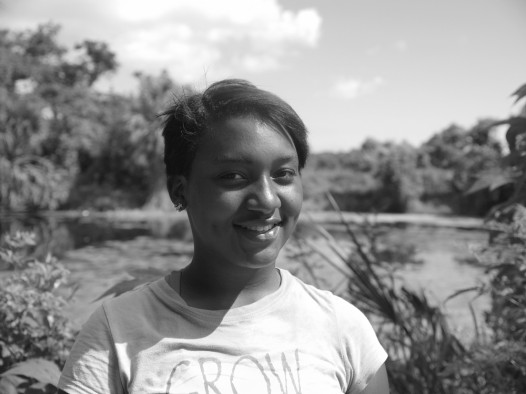
Ashley Morgan (photo by Rene Merino)
They are unlikely friends.
Ashley Morgan, 17, was born in the Lower 9th Ward, now lives in the 7th, and is a junior at NET Charter School in Central City, which serves struggling students.
Jeanne Firth, 29, comes from a long line of farmers in Kansas, studied (among other places) at the London School of Economics, followed a friend to New Orleans a few years ago, “and was one of those folks who came and just fell in love with the city.”
Both were on hand at the Mother’s Day second line on Frenchmen Street where a shooting claimed 20 victims. Ashley was a few blocks away when the gunshots started; Jeanne was at ground zero, and dived instinctively to safety behind a front porch.
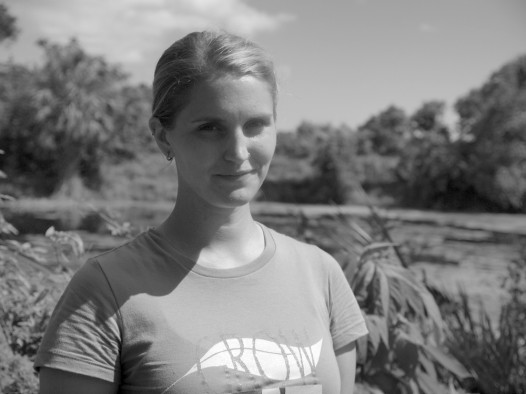
Jeanne Firth (photo by Rene Merino)
They’re together a lot. Most days, the two work side by side, coaxing ripe fruits and vegetables from the rows of produce they have painstakingly helped plant at Grow Dat Youth Farm. The 4-acre site in City Park is home to a program that offers job opportunities to high-school students in the area of urban agriculture. Along the way, they learn things like leadership skills, food justice, agricultural skills and cooking and nutrition. Ashley is a crew member there, Jeanne a founding member and the program specialist.
Last week, the two sat down in a small conference room tucked into one of Grow Dat’s buildings, all retrofitted cargo containers, and talked about the program, their dreams and concerns, and their views on violence.
“It was a wonderful celebration,” Jeanne says of those first moments of the Big 7 Social Aid and Pleasure Club second line on May 12. “It was our co-director’s social aid and pleasure club, so pretty much our entire staff and extended community was there. We were sort of spread out among the crowd.“Some guy was jumping on a trampoline, and were all turning to watch. Just as we turned back, the shooting started. We all went into hiding, and I’m looking around for all the people I knew.”
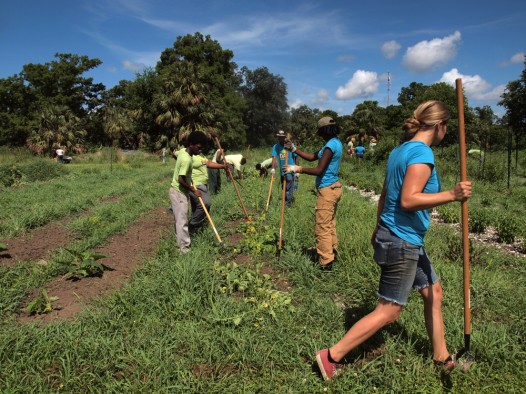
In the fields at Grow Dat Youth Farm (photo by Rene Merino)
Ashley was waiting for the second line on St. Bernard Avenue at Tonti. It never came. “We were like, where are they?” she says. “And then this lady was walking by and saying, ‘It’s so messed up. They shot two babies and a white man.’ All she knew was about the babies. It touched me so bad.”
In the aftermath of the shooting, Grow Dat staff and volunteers gathered for a day of discussion and reflection about violence in New Orleans. They watched excerpts from “Shell Shocked,” a documentary about the affects of violence on New Orleans youth. They brainstormed solutions, and made construction paper trees, filled with unhealthy leaves mapping systems of violence, and healthy ones with leaves tracing components of a strong community. (Take a look at their work here.)
For Jeanne, who lives just off Esplanade Avenue in the 7th Ward, the Mother’s Day shooting “was the most intimate occurrence of gun violence I’ve ever been part of.”
For Ashley, violence – including gunshots – is an everyday thing. Growing up surrounded by it, she says, “it never occurred to me to be scared or frightened. I know a lot of people who got shot. Just getting off the bus you’ll hear shots around the corner.”
They have talked about the difference in their perception of violence, these two women – how one had never really been exposed to it, and the other had never been part of anything else. “Some of these kids are shocked that no one in my family has been murdered,” says Jeanne. “Something is so wrong when having a murder in the family is normal for people.”
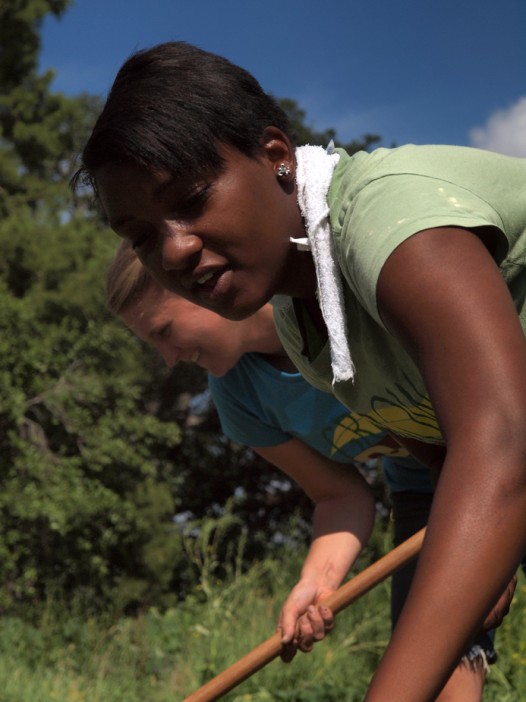
Jeanne and Ashley work at Grow Dat Youth Farm (photo by Rene Merino)
Grow Dat helps to address that difference by building relationships with teens, and giving them choices and responsibility.“We set real goals,” Ashley says. “Like how much we’ll grow and sell – we raised 9,000 pounds of food this year. Everybody works real hard to meet that kind of goal.”
It was a new idea for a student who once found herself in the principal’s office more than the classroom, and who admits to having been the class clown in an attempt to hide her shyness. “I doubted myself,” she says. “Then I got this opportunity to learn. I got mature in a certain way. A lot of kids have a routine of just sitting around, no motivation. They don’t ever get a chance to see that there are other things they can do.”
“There’s a dearth of resources for youth in these neighborhoods,” agrees Jeanne. “And there does seem to be a sense of disinvestment in these areas. There are kids who work here who literally can’t leave their homes, for fear they will be a target.”If she had a million dollars, says Jeanne, she’d give money to cultural entities like second lines and public art projects and youth development. She’d fund justice reform initiatives, too, to work to prevent young people being sent to jail for minor offenses.
“They can’t make bail and find themselves caught in the system,” she says. “They can be held for 60 days without charge. A lot of the youth lawyers we work with say that they spend a staggering amount of time on traffic issues – just paying fines and fees is a huge problem. That label of ‘criminal’ is strong. People start to believe it themselves.”
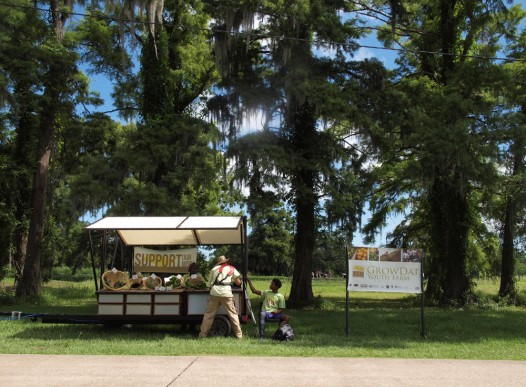
Selling produce at Grow Dat Youth Farm (photo by Rene Merino)
“If young kids go to jail and hear all of these older guys there, they become fit for that life,” adds Ashley. “Then there’s no chance of them getting an education, nothing to look forward to.”
Community perceptions play a part as well.
“The media always brings the negative out, but never the positive,” says Ashley. “It’s never about opportunity, but about what people are doing wrong. If you keep telling a person what he’s doing wrong, he won’t change. If you tell him what he can do right, then he can change.”
A lot of the city’s violence, Ashley believes, can be traced to simple escalation of grudges and neighborhood rivalries.
“Some people always want to take it to the next level. My cousin is in that zone of retaliation and violence. I can’t motivate him. But people are always putting him down – he’s bad, his luck is gonna run out. I don’t look at it like that. He doesn’t know any different lifestyle. Guns are all he knows.
”Guys think that violence is the way to show that they’re strong. They think that’s what girls want. And girls grew up with their fathers that way.”
Not that she shirks personal responsibility: “You can’t let others control you. You can’t keep looking for this or that to change. We have to make changes ourselves. You can start with just one thing. Like choosing not to have a child. You start small, and say I don’t need this.”
Communication is a core principal for both women.
“We are not going to solve social problems unless different people start talking to one another,” says Jeanne. “We talk about that a lot at Grow Dat.”
“At Grow Dat there are people like me,” says Ashley, “but there also are white people from private schools. We have conversations. Those connections are important.”
Jeanne nods. “When you know a people as a group, you have stereotypes. But when you know individuals, you begin to know people in a meaningful way. It’s about trust.”
Voices on Violence: Conversations about life in New Orleans is a NolaVie/WWNO series that features individual interviews with the city’s residents. If you would like to be interviewed, or to comment on the series, email voices@nolavie.com. Renee Peck is editor of NolaVie. Email her at nolavie.com.
 NOLAbeings Multimedia artist Claire Bangser created NOLAbeings as a portrait-based story project that marries...
NOLAbeings Multimedia artist Claire Bangser created NOLAbeings as a portrait-based story project that marries...  Voodoo in New Orleans: Reviving history: New Orleans fortune telling This article takes a deep dive into the history of Voodoo in New Orleans, its hybridization with Catholicism, and its present-day place in the city's culture. The author visits fortune-tellers in the French Quarter, using their guidance as a tool for introspection rather than a deterministic predictor of the future. Through her experiences in New Orleans, the author feels a mystical connection to both the past and the future.
Voodoo in New Orleans: Reviving history: New Orleans fortune telling This article takes a deep dive into the history of Voodoo in New Orleans, its hybridization with Catholicism, and its present-day place in the city's culture. The author visits fortune-tellers in the French Quarter, using their guidance as a tool for introspection rather than a deterministic predictor of the future. Through her experiences in New Orleans, the author feels a mystical connection to both the past and the future. 